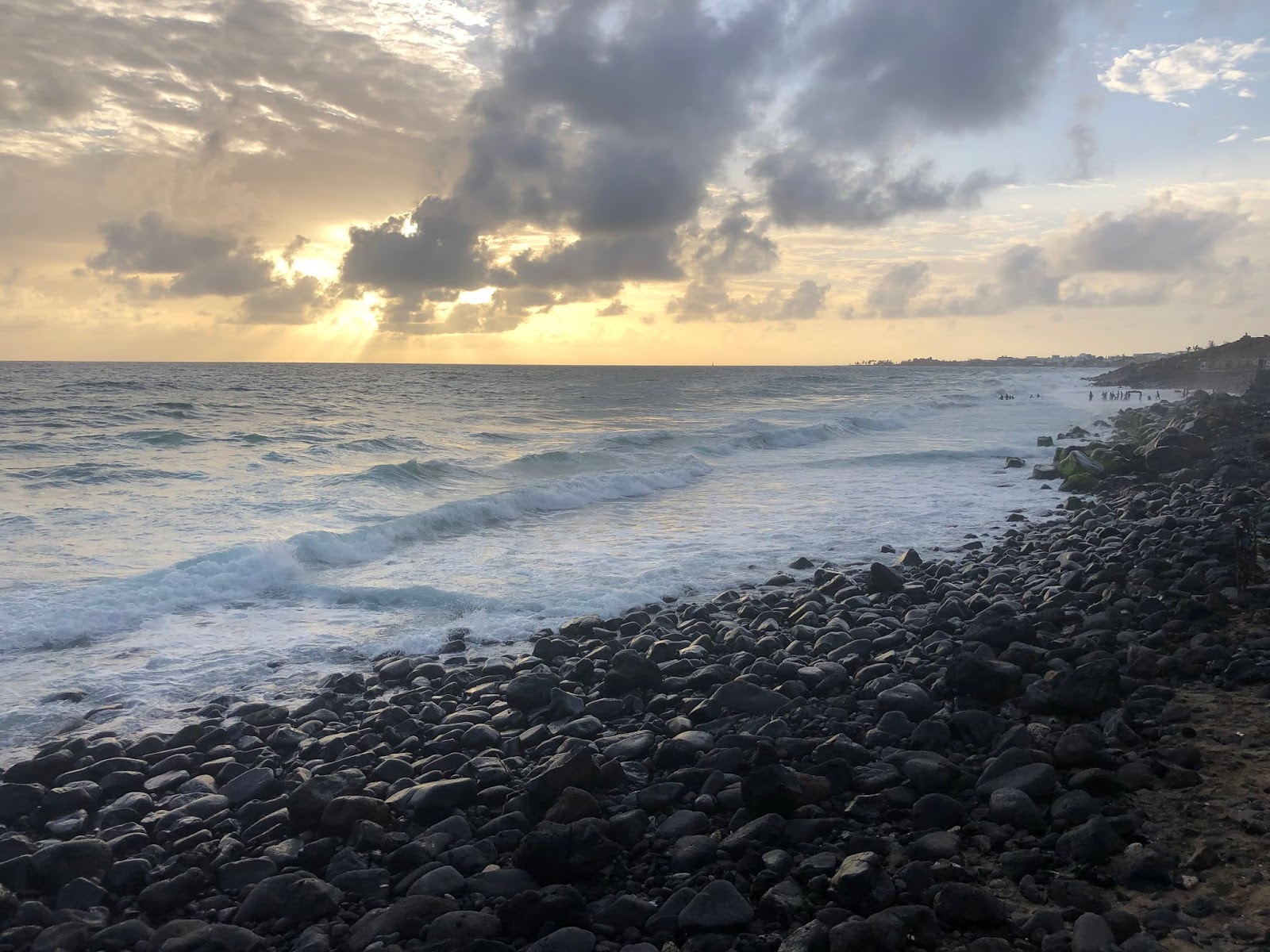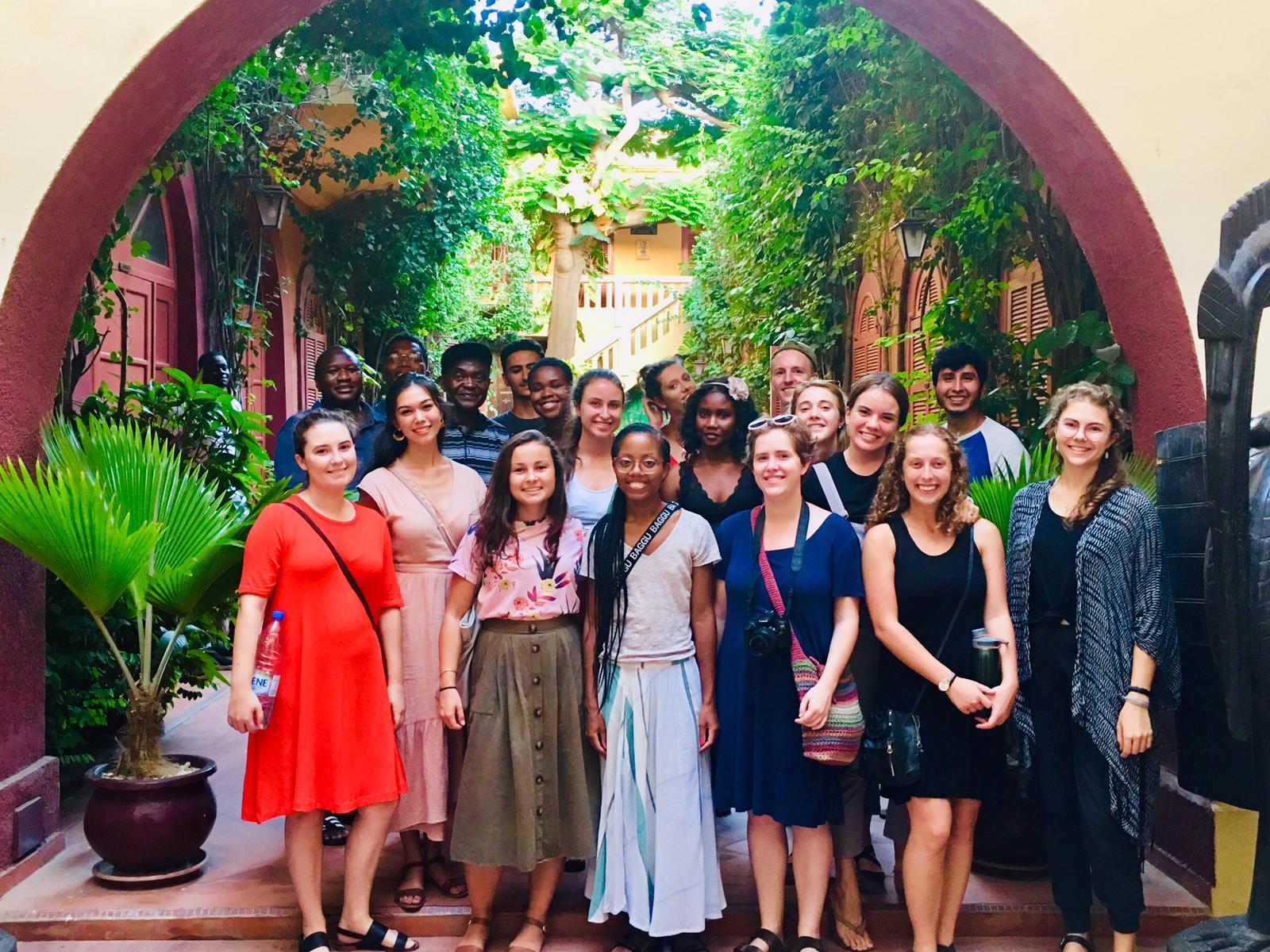Bienvenue à Dakar: Challenges and New Beginnings
**NOTE: This post brought to you in both English and French
Sénégal
ORIGIN
Wolof: Sunu gaal, meaning "our pirogue" or "our canoe." The story goes that when the Portuguese, the first Europeans in the area, arrived in the 16th century, they asked the locals through body language and facial expressions what this land is called. The locals, not knowing Portuguese, thought the foreigners were asking about where they were located in that exact moment –– What is this? This is our canoe. And thus the region became known as Senegal.
 |
| The AFLI crew at the Monument of the African Renaissance |
It's been almost three weeks now since my arrival in Dakar, and I've experienced a whirlwind of first impressions and accompanying emotions since the moment I stepped off the plane. I chose to put off this post for a little while, the short explanation being because, simply put, it was a hard first week or two. The longer explanation is I wasn't anticipating the creature comforts I'd miss, from no A/C to no wifi and streets that flood every time it rains and air pollution so bad I thought I was catching a cold the first week. I didn’t want my report back home to be colored by unfair negativity and complaints. I know most of my friends and family have never been to Dakar, Senegal more broadly, or even the continent of Africa. It's essential that I relate both the good and the bad.
But more importantly, I realized how much I don't need and how much a safe and comfortable home environment can shape my day and outlook. I had a difficult relationship with my host family that started with missing furniture and not enough space, and then quickly deteriorated so much my resident director and I decided it would be best if I switched families. This was incredibly anxiety-inducing, and I found myself wondering how I was going to spend almost four months in this city. Did I make a mistake in coming here? Since moving in with my new family, however, all the things that I thought were bothering me about Dakar have started to melt away. So I eat endless amounts of baguettes and rice, so what? So I spend day-in day-out sweating, so what? So I can't call friends or family from the comfort of my bedroom, so what?
"You can only reap what you sow."
 |
| The terrace of my house |
What I do have is wonderful friends who are all in the same boat, struggling in language and cultural learning together. I have a loving host family that is modifying their lifestyle for my comfort. I have beautiful beaches with perfectly warm water and little fish that try to nibble on me. I have fresh mangoes –– every day if I want. I have cooling showers that clean the day's sweat and dirt off of me. I wake to the call of prayer and the first light of a new day each morning. From the terrace of my house, I can see all the stars, pinpricks of light from long ago and worlds away.
I've found that it is a futile and painful trap to focus on all you do not have, while ignoring all that you do. A week ago, for the first time since coming here, I started feeling that I wouldn't have enough time here, and wondering if there was a way to come back, to stay a little longer.
Our school: The West African Research Center (WARC)
|
In the United States, there’s a belief that “Africa” (yes, often referred to as if it is all the same, despite the continent’s immense diversity) is poor, underdeveloped, uneducated, and always experiencing famine, coups, or dictatorships. This is a false stereotype. But it is all too easy to fall in the other direction, believing that African countries are just like the US – that poverty and development are nothing but a myth. In my time here so far, I’ve found that there can be both; there are tens of thousands of impoverished children forced to beg on the street, half-constructed buildings, and missing sidewalks, just as there are beautiful, clean beaches and luxury cafés and spas nicer than those back home. Dakar is a city of contrasts, and it would be foolish to blind yourself to one side of it.
We've been analyzing Senegalese fairy tales and fables in class, and in identifying the moral of one of the stories, my French professor told us a proverb: "On ne récolte que ce qu'on a semé." You can only reap what you sow. I'm trying to sow positivity, gratitude, patience. I'm trying to learn with an open, but critical mind (can I have both?) And I'm trying to breathe in all that Senegal has to offer.
Bienvenue à Dakar : défis et nouveaux débuts
Sénégal
ORIGINSénégal
Wolof: Sunu gaal, signifiant « notre pirogue ». L’histoire est que quand les portugais, les premiers européens dans la région, ont arrivé dans le XVIèmesiècle, ils ont demandé aux autochtones ce terre, comment s’appelle-t-il ? Les indigènes, qui ne parlaient pas portugais, ont cru qu’ils demandaient où ils se trouvent à ce moment exact –– Qu’est-ce que c’est ? C’est notre pirogue. Et donc, la région est devenue connue sous le nom de Sénégal.
Ça fait presque trois semaines maintenant depuis mon arrivée à Dakar, et j’ai ressenti un tourbillon de premières impressions et des émotions qui les ont accompagné depuis le moment je me suis descendue l’avion. J’ai choisi à reporter ce post un petit moment, l’explication bref étant car, simplement, c’étaient une ou deux semaines difficiles. L’explication plus long est que je n’ai pas prévu le confort matériaux me manquerait : de l’absence de la climatisation et du wifi aux inondations chaque fois qu’il pleut et la pollution d’air si mal qui j’ai pensé que j’ai attrapé un rhume ma première semaine ici.
Mais plus important, je me suis rendue compte à quel point je n’ai pas besoin, et à quel point un milieu familial qui est sûr et où on est à l’aise peut influencer ma journée et mon point de vue. J’avais une relation difficile avec ma famille d’accueil qui a commencé avec des meubles manquants et pas assez d’espace, et puis s’est tellement détériorée que ma directrice résidente et moi avons décidé qu’il sera mieux de changer des familles. Cela était angoissante, et je me demandais comment j’allais passer près de quatre mois dans cette ville. Est-ce que j’ai commis une erreur en venant ici ? Depuis que je me suis installé avec ma nouvelle famille, cependant, tout ce qui m’ennuyait à Dakar a commencé à fondre comme neige au soleil. Alors je mange des baguettes et du riz sans limite, et alors ? Alors je passe jour après jour à suer, et alors ? Alors je peux pas appeler ni mes amis ni ma famille sans quitter chez moi, et alors ?
« On ne récolte que ce qu’on a semé. »
Ce que j’ai, ce sont de merveilleux amis qui sont tous dans le même bateau, en difficulté ensemble avec l’apprentissage des langues et de la culture. J’ai une famille d’accueil aimante qui modifie samode de vie pour monconfort. J’ai de belles plages avec l’eau parfaitement chaude et de petits poissons qui essaient à me grignoter. J’ai des mangues fraiches –– chaque jour si j’en veux. J’ai des douches assez froides qu’elles enlèvent la sueur et la poussière de la journée. Je me réveille à l’appel de prière chaque matin. De la terrasse de ma maison, je peux voir toutes les étoiles, des piqûres d’épines de lumière d’antan et de mondes lointains.
J’ai trouvé que c’est un piège douloureux et futile de se concentrer sur tout ce que l’on n’a pas, tout en ignorant tout ce que l’on a. Il y a une semaine, pour la première fois depuis je suis arrivée, j’ai commencé à me sentir que je n’aurais pas assez de temps ici, et me demander s’il y a un moyen à retourner, à rester un peu plus longtemps.
Aux États-Unis, il y a une croyance que « l’Afrique » (oui, souvent mentionnée comme si elle est toute la même, malgré la diversité immense du continent) est pauvre, sous-développée, sans instruction, et toujours victimes des famines, coups d’états, et dictateurs. C’est un stéréotype faux. Mais c’est tout facile de tomber dans l’autre sens, de croire que les pays africains sont exactement les mêmes que les États-Unis –– que la pauvreté et le développement sont rien qu’un mythe. Depuis mon arrivée ici jusqu’à ce moment, j’ai découvert que les deux peuvent exister à la fois ; il y a dizaines de milliers d’enfants appauvris forcés de mendier dans la rue, des bâtiments semi-construits, et des trottoirs manquants, tout comme il y a de belles plages propres et des cafés et spas de luxe, meilleurs que ceux chez moi. Dakar est une ville de contrastes, et ce serait bête de s’aveugler d’un côté.
Nous analysions des contes et fables sénégalais en classe, et en identifiant la moralité de l’une des histoires, mon prof de français nous a dit un proverbe : « On ne récolte que ce qu’on a semé. » J’essaie de semer la positivité, la gratitude, et la patience. J’essaie d’apprendre avec un esprit ouvert, mais critique (peux-je avoir les deux à la fois ?) Et j’essaie d’inspirer de tout ce que le Sénégal a à offrir.







Dakar sounds beautiful and I appreciate your recognition of both sides, the underdeveloped and the luxurious. Thanks for bringing this reflection in both English and Francais!! What a fantastic way of practicing.
ReplyDelete